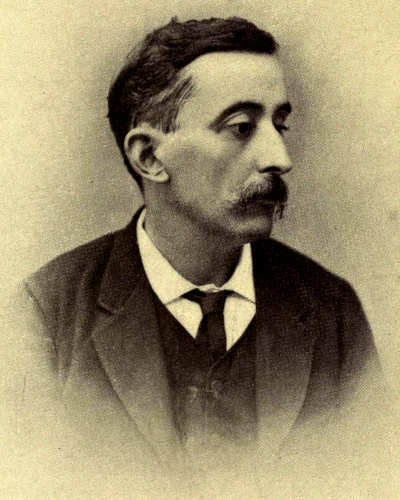The Name on the Stone by Lafcadio Hearn

“The Name on the Stone” was first published on 9 October 1880, in The New Orleans Item. In 1914, the story was republished posthumously in Fantastics and Other Fancies, a collection of 36 short stories by Lafcadion Hearn.
About Lafcadio Hearn
Patrick Lafcadio Hearn was a writer, teacher, and translator, who had a very productive life and was a prolific author of speculative fiction. He was Born 27 June 1850, on the Ionian Island of Lefkada, but spent most of his early life in Dublin, Ireland.
When he was 19 years old, Hearn emigrated to the USA and began working as a newspaper reporter. Following a stint working for a newspaper in New Orleans, he became a correspondent to the French West Indies, remaining on the island of Martinique for two years, before relocating to Japan, where he spent the rest of his life. In 1891, he married Setsuko Koizumi, a lady from a high-ranking Samurai family. The couple had four children.
Hearn’s writings about Japan were fundamental in providing the Western world with an insight into what was then an unfamiliar culture. In 1894, many of his articles and essays were collected and published as the two-volume book Glimpses of Unfamiliar Japan.
Hearn was at his most prolific between 1896 and 1903, while working as professor of English literature at the Imperial University of Tokyo. He wrote four books during this time, including a collection of supernatural stories called Ghostly Japan (1899).
In addition to producing his own work, Hearn also a translated many of Guy de Maupassant’s stories from French to English.
Lafcadio Hearn died in Tokyo, on 26 September 1904.
The Name on the Stone
by Lafcadio Hearn
(Online Text)
“As surely as the wild bird seeks the summer, you will come back,” she whispered. “Is there a drop of blood in your veins that does not grow ruddier and warmer at the thought of me? Does not your heart beat quicker at this moment because I am here? It belongs to me;—it obeys me in spite of your feeble will;—it will remain my slave when you are gone. You have bewitched yourself at my lips; I hold you as a bird is held by an invisible thread; and my thread, invisible and intangible, is stronger than your will. Fly: but you can no longer fly beyond the circle in which my wish confines you. Go: but I shall come to you in dreams of the night; and you will be awakened by the beating of your own heart to find yourself alone with darkness and memory. Sleep in whose arms you will, I shall come like a ghost between you; kiss a thousand lips, but it will be I that shall receive them. Though you circle the earth in your wanderings, you will never be able to leave my memory behind you; and your pulse will quicken at recollections of me whether you find yourself under Indian suns or Northern lights. You lie when you say you do not love me!—your heart would fling itself under my feet could it escape from its living prison! You will come back.”
* * *
And having vainly sought rest through many vainly spent years, I returned to her. It was a night of wild winds and fleeting shadows and strange clouds that fled like phantoms before the storm and across the face of the moon. “You are a cursed witch,” I shrieked, “but I have come back!”
And she, placing a finger—white as the waxen tapers that are burned at the feet of the dead—upon my lips, only smiled and whispered, ” Come with me.”
And I followed her.
The thunder muttered in the east; the horizon pulsated with lightnings; the night-birds screamed as we reached the iron gates of the burial-ground, which swung open with a groan at her touch.
Noiselessly she passed through the ranges of the graves; and I saw the mounds flame when her feet touched them,—flame with a cold white dead flame like the fire of the glow-worm.
Was it an illusion of broken moonlight and flying clouds, or did the dead rise and follow us like a bridal train?
And was it only the vibration of the thunder, or did the earth quake when I stood upon that grave?
“Look not behind you even for an instant,” she muttered, “or you are lost.”
* * *
But there came to me a strange desire to read the name graven upon the moss-darkened stone; and even as it came the storm unveiled the face of the moon.
And the dark shadow at my side whispered, “Read it not!”
And the moon veiled herself again. “I cannot go! I cannot go!” I whispered passionately, “until I have read the name upon this stone.”
Then a flash of lightning in the east revealed to me the name; and an agony of memory came upon me; and I shrieked it to the flying clouds and the wan lights of heaven!
Again the earth quaked under my feet; and a white Shape rose from the bosom of the grave like an exhalation and stood before me: I felt the caress of lips shadowy as those of the fair phantom women who haunt the dreams of youth; and the echo of a dead voice, faint as the whisper of a summer wind, murmured:—”Love, love is stronger than Death!—I come back from the eternal night to save thee!”
Lafcadio Hearn (1850 — 1904)
______________________________
